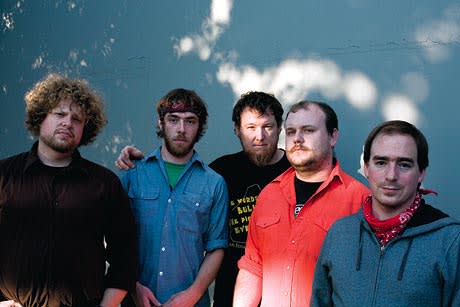Sojourner's wealth of excellent unreleased material provides a faint glimpse into the methodology of Jason Molina, a truly driven artist. In some respects, the ambitious nature of this four-record (plus one DVD) box set is a temporal illusion. Since 2005's What Comes After the Blues, Magnolia Electric Co. have hit the road hard, completing three recording sessions (plus a solo Molina recording) along the way. Instead of standing as individual documents, the results have been lovingly harvested in this wooden box, with accompanying trinkets. Given their compositional proximity, the records do possess interconnected imagery and sounds. As the title implies, travelling – both in literal and symbolic terms – is the central theme, emerging out of mystical, rustic backdrops borrowed from Neil Young. The studio stops alone are interesting: Steve Albini engineers the eclectic Nashville Moon in Chicago; Cracker's David Lowery produces the moody Black Ram in Virginia; and Molina pops into Memphis's historic Sun Studios for the EP Sun Session. The abstract film The Road Becomes What You Leave portrays interpersonal minutiae and the band struggling through the Canadian prairies. The ornate exterior of Sojourner belies the stoic, working-class feel of Molina's artistic stance as a well-worn troubadour without a home.
Do you view Sojourner as a unified statement?
Molina: I'd worked hard on the lyrical themes on all of these releases and I became deeply committed to cycling out the few symbols that I've been writing with since I began writing songs. I personally don't feel like I've exhausted this material and these recordings are serious explorations for me. As with most everything I've ever put to tape, it's another step towards finding what's around the next corner creatively.
Are you happy with the DVD?
The wonderful folks who did this piece are true music fans and honest to goodness great people. The creative license they took with me singing karaoke [however] is unforgivable. I never sang a Neil Young song that night; I was singing an old country standard and they edited that in. It makes it that much harder for me to stop being compared to him and Crazy Horse. I can't tell you how upsetting it is that that's how the film was treated in that small way, since it was dishonest. Otherwise, it's very accurate, as far as a film of a band on the road goes.
(Secretly Canadian)Do you view Sojourner as a unified statement?
Molina: I'd worked hard on the lyrical themes on all of these releases and I became deeply committed to cycling out the few symbols that I've been writing with since I began writing songs. I personally don't feel like I've exhausted this material and these recordings are serious explorations for me. As with most everything I've ever put to tape, it's another step towards finding what's around the next corner creatively.
Are you happy with the DVD?
The wonderful folks who did this piece are true music fans and honest to goodness great people. The creative license they took with me singing karaoke [however] is unforgivable. I never sang a Neil Young song that night; I was singing an old country standard and they edited that in. It makes it that much harder for me to stop being compared to him and Crazy Horse. I can't tell you how upsetting it is that that's how the film was treated in that small way, since it was dishonest. Otherwise, it's very accurate, as far as a film of a band on the road goes.
